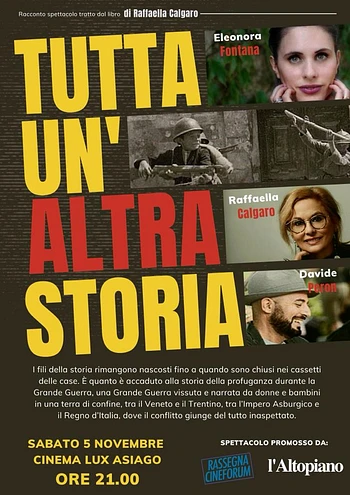
Saturday 5 November 2022, at the Cinema Lux of Asiago, the story / show will be proposed: "Tutta un'altra storia", taken from the homonymous book by Raffaella Calgaro.
The show, on the initiative of the Giornale L'Altopiano and with the collaboration of the Cinema Lux film festival, will begin at 21:00.
It is the story of the Great War and above all of the Refugee seen with other eyes, told by other voices, those of women and children. And it really comes out a totally different story than the one we have been used to studying at school or reading on the many books on the market that narrate that sad period for Italy and for the Plateau.
An unprecedented formula of show provides for the presence on stage of the author Raffaella Calgaro who will accompany the spectator along the threads of history that will be able to relive the facts through the acting of Eleonora Fontana and the music of Davide Peron, getting excited.
Historical background
The threads of history remain hidden until they are closed in the drawers of the houses. This is what happened to the history of refugees during the Great War, a Great War lived and narrated by women and children in a borderland, between Veneto and Trentino, between the Habsburg Empire and the Kingdom of Italy, where the conflict comes completely unexpected. May 1915. Close to the front, women, the elderly and children are forced to flee precipitously. Thousands of soldiers arrive in the Vicenza area occupying churches, squares and districts. Coexistence is difficult and generates walls: on this side there are women, beyond the military. Only children cross the threshold and push themselves with their games in the forbidden spaces. Even the house, once a reassuring and protected place, reserves disorientation. The man, the pater familias, is absent, and the woman finds herself having to face alone the organization and management of the family economy. Invisible until some time before, with the war she becomes master of herself fleeing from any patriarchal control. Now it is she who decides, who leaves the home, who informs herself, writes requests, goes to work. Alongside traditional trades, such as washing or mending uniforms, women become workers in factories, digging trenches, transporting stones, preparing racks. In 1916, the so-called Punitive Expedition forced thousands of people to flee. From the mountains, valleys and foothills, a human stream seeks a way of salvation. There are those who take the train, those who escape on foot, those who jump on wagons. A staggering number of refugees invade towns and cities. But the escape for many turns into tragedy. In the general confusion, it can happen that mothers lose their children. Some will find them after a few days, others after years, others will never see them again. Then, as always, war enters homes, devastates family ties and imposes forced removals. Women, old people and children, catapulted into the front line, become helpless and silent protagonists of an escape from violence in search of peace. Refugees flee from their microcosm, travel, suffer, lose their children. And children, in a time that does not understand, nor leaves room for childhood, suddenly become adults. Then, as always, the tragedy of war redefines rules and values, and erases the identity of the people who live close to the conflict.